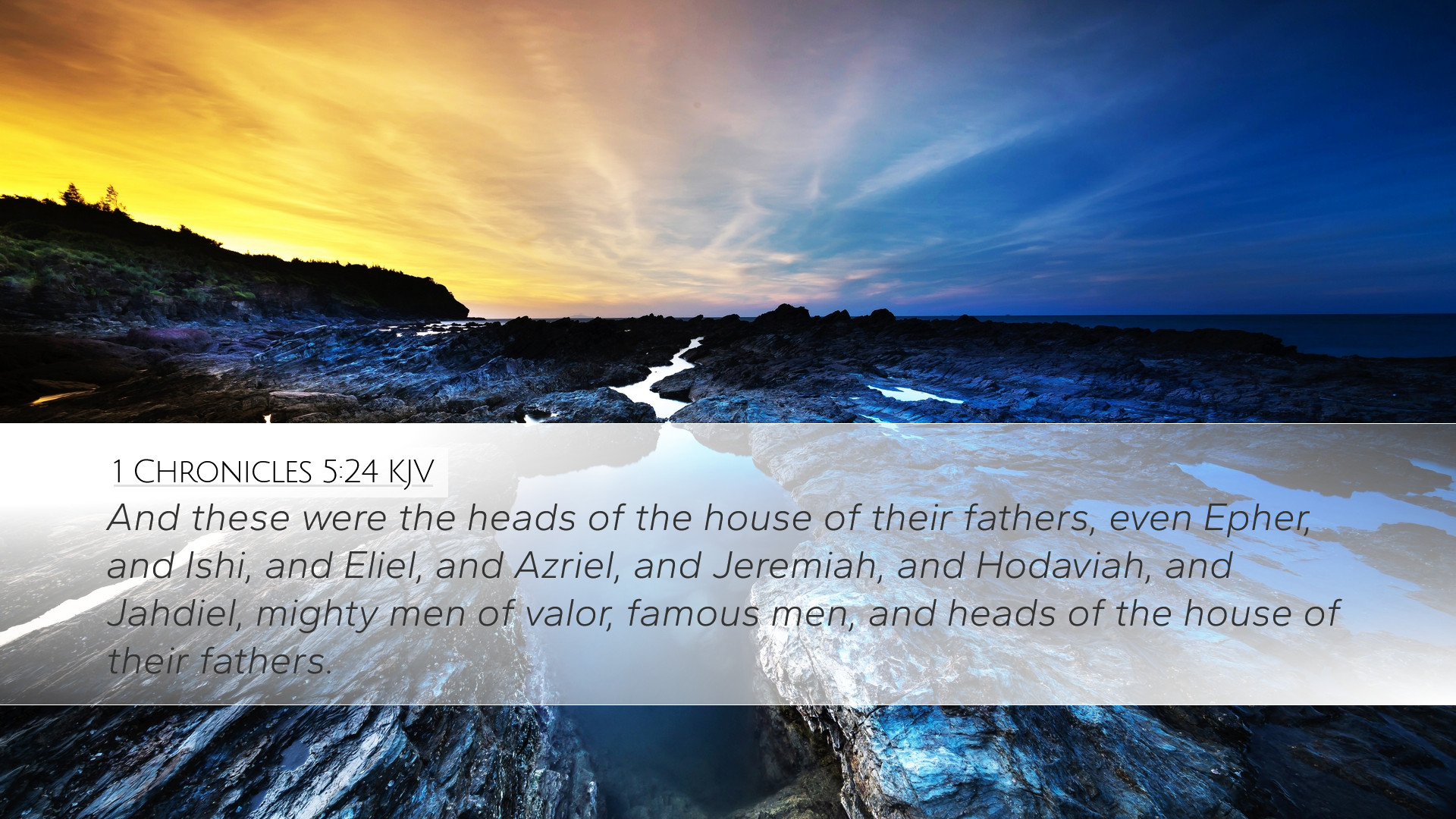Commentary on 1 Chronicles 5:24
Verse: 1 Chronicles 5:24 - "And these were the heads of the houses of their fathers, even Epher, and Ishi, and Eliel, and Azriel, and Jeremiah, and Hodaviah, and Jahdai, mighty men of valour, famous men, and heads of the houses of their fathers."
Introduction
This verse serves as a continuation of the genealogical and historical record of the tribes of Israel, specifically focusing on the tribe of Reuben. The passage highlights the leaders of families within this tribe, recognized for their might and fame. The analysis of this verse encourages us to contemplate the significance of leadership and legacy in a biblical context, affirming the value of those who played pivotal roles in the formation of Israel’s history.
Contextual Background
In the approach to 1 Chronicles, it is essential to recognize the Chronicler's intent. The Chronicles often serve as a theological reflection, stressing the importance of heritage and divine promise. The genealogies trace the lineage of the tribes and underscore God's faithfulness to His covenant people. Here, the mention of “mighty men of valour” connects to the overarching theme of God’s empowerment of individuals for His purpose.
Insights from Matthew Henry
Leadership and Valor: Henry emphasizes the strength and reputation of these leaders. He notes that they were not just names in a genealogy but men of real significance who played an instrumental role in Israel’s history. The reference to ‘mighty men of valour’ indicates not just physical strength, but moral and spiritual righteousness, essential for leadership in Israel.
Insights from Albert Barnes
Significance of Names: Barnes elaborates on the names listed in this passage, suggesting that each name represents a lineage with historical importance. The head of each household signifies a legacy that connects to God’s covenant, which runs throughout the nation of Israel. Barnes mentions that this verse serves to encourage future generations by providing a sense of continuity and stability within their heritage.
Insights from Adam Clarke
The Narrative of Strength: Clarke points out the contrast between the physical battles that these ‘mighty men’ would contend with and the spiritual battles that the nation faced. He argues that true valor goes beyond physical conquests; it involves steadfastness in faith and adherence to the tenets of God’s law, a vital aspect for leaders in Israel.
Theological Reflections
Leadership in the Context of Faith: This verse serves as a reminder that leadership within the church and community is not merely about authority or position but about character and commitment to God. The leaders mentioned exemplified what it means to have valor not just in battle but in faithfulness to God’s mission.
Characteristics of Godly Leadership:
- Courage: The leaders mentioned display fortitude, illustrating the call for those in leadership to face challenges without fear.
- Reputation: The fact that they were "famous men" denotes that their actions and integrity spoke volumes in their culture.
- Legacy: Each leader's life continues to speak to the generation that follows, instilling values and principles for the future.
Practical Application
For Pastors and Leaders: In light of this verse, church leaders are encouraged to reflect on their own leadership qualities. Are they leading with valor and integrity? This passage serves as an exhortation to embody the traits of godly leadership and to be mindful of the legacy they will leave behind.
For Students and Theologians: Biblical scholars should examine how genealogical records, like the one in this verse, serve not only as historical documents but also as teaching tools that highlight God’s providence and promise. Analyzing these records can lead to richer insights regarding God’s covenant relationship with His people.
Conclusion
1 Chronicles 5:24 encapsulates the importance of acknowledging the leaders and their contributions within the narrative of Israel. The insights derived from the noted commentators encourage a deeper understanding of what it means to lead in accordance with God’s calling. As we reflect on these “mighty men of valour,” let us aspire to carry their legacy of strength and faithfulness into our own lives and ministries.


